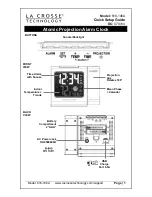
© 2005 directed electronics, inc.
9
changes more than a volt when using the dimmer, look for another wire. If it
stays relatively close to (+)12V, you have found your parking light wire.
(-) parking light wire
Use the following procedure to find (-) parking light wire with your multimeter.
1.
Set to DCV or DC voltage (12V or 20V
is fine).
2.
Attach the (+) probe of the meter to
+12V.
3.
Probe the wire you suspect of being the
parking light wire. Usually, the area
near the headlight/parking light switch
is an excellent area to start, as is the
kick panel.
4.
Turn on the parking lights. If your meter shows (+)12V, turn off the parking lights
and make sure it goes back to zero.
5.
If it does return to zero, turn the parking lights back on and, using the dash light
dimmer control, turn the brightness of the dash lights up and down. If the meter
changes more than a volt when using the dimmer, look for another wire. If it
stays relatively close to (+)12V, you have found your parking light wire.
finding the door pin switch circuit
The best places to find the door switch wire are:
At the pin switch: When testing at the pin switch, check the wire to ensure that it “sees”
all the doors. Often, the passenger switch will cover all the doors even if the driver’s
switch will not.
At the dome light: This may not be your best choice if the vehicle has delayed domelight
supervision, but it will work in vehicles with completely diode-isolated pin switches.
Often the door switch wires, described above, can also be found in the windshield pil-
lars, running boards or kick plates.
Use the following procedure to find the door pin switch wire with your multimeter.
1. Set to DCV or DC voltage (12V or 20V is fine).












































